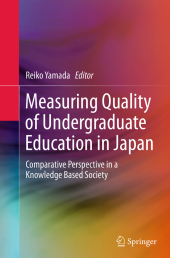 Neuerscheinungen 2016Stand: 2020-02-01 |
Schnellsuche
ISBN/Stichwort/Autor
|
Herderstraße 10
10625 Berlin
Tel.: 030 315 714 16
Fax 030 315 714 14
info@buchspektrum.de |

Reiko Yamada
Measuring Quality of Undergraduate Education in Japan
Comparative Perspective in a Knowledge Based Society
Herausgegeben von Yamada, Reiko
Softcover reprint of the original 1st ed. 2014. 2016. xxi, 221 S. 14 SW-Abb., 34 Tabellen. 235 mm
Verlag/Jahr: SPRINGER, BERLIN; SPRINGER SINGAPORE; SPRINGER 2016
ISBN: 9811013292 (9811013292)
Neue ISBN: 978-9811013294 (9789811013294)
Preis und Lieferzeit: Bitte klicken
This book explores how the global trend of quality assurance in higher education is related to the boom of measuring learning outcomes in Japan. It also presents a comparative study in higher education policy between Japan and the US, examining how both countries have reacted to the demands of globalization. This comparative view will help readers understand the present issues Japanese higher education faces and grasp the commonalties and differences between American and Japanese higher education.
The book first explores the forces of globalization that have resulted in Japanese universities emphasizing student learning outcomes. Next, it examines how Japanese higher education has learned from the experience of the U.S., whose higher education reform has been regarded as a model for Japan. The book explains why quality assurance for teaching and learning has become important for all Japanese higher education institutions.
Higher Education on a global basis is now facing a great issue. In order to help students in a competitive global market, universities need to become more teaching-and-learning-centered and develop more internationalized curricula. This book provides comparative views for cultural and structural similarities and differences in higher education in two countries which could explain significant differences in the gains students make in college. It will help readers understand not only how student learning outcomes can be measured, but why universities throughout the world must continually strive to become world-class institutions.
Foreword by Randy Swing
Preface by Reiko Yamada
Part I: Trend of Quality Assurance of Higher Education in Comparative Perspective
Chapter 1. Higher Education and Quality Assurance: Some Observations by John N. Hawkins
Chapter 2. Japanese Higher Education: Policies and Future Issues by Reiko Yamada
Chapter 3.Comparative Analysis of Campus Internationalization Trends: Between Japan and the United States by Aki Yamada & Reiko Yamada
Part II: Measuring Student Learning Outcomes
Chapter 4. Rethinking Between-College Effects on Student Learning: A New Model to Guide Assessment and Quality Assurance by Patrick T. Terenzini and Robert D. Reason
Chapter 5. Lessons from the US Experiences: Measuring Learning Outcomes and the Role of JCIRP for Assessing Student Learning by Reiko Yamada
Chapter 6. Learning Outcomes among College Students in Japan: Comparative Analysis Between and Within Universities by Reiko Yamada
Chapter 7. Quality Assurance in Education and Institutional Research by Reiko Yamada
Part III: Quality Assurance of Undergraduate Education: Comparative Analysis between USA and Japan
Chapter 8.What Kind of Issues and Challenges Does Japanese Undergraduate Education Face? A Comparative Analysis between the USA and Japan by Reiko Yamada
Chapter 9. A Comparative Study of Japanese and US First-year Seminars: Examining Differences and Commonalties by Reiko Yamada
Chapter 10. Development of First-Year Education by Reiko Yamada
Chapter 11.Issues of Educational Articulation between High School and University: A Comparative Analysis between the United States and Japan by Reiko Yamada
Chapter 12. Conclusion. Toward Quality Assurance in University Education by Reiko Yamada
Reiko Yamada is a professor at Faculty of Social Studies, Doshisha University, and a Director of Center for Higher Education and Student Research. She is the leading person in this field in Japan. Her researches on Japanese student development and learning outcomes based on college impact theory are well recognized in not only in Japan but also in the United States and Korea. The author developed the self-reported student surveys (JCIRP) from 2004 which are comparable with US surveys so called CIRP developed by HERI (UCLA) and 130,000 students participated in the JCIRP by the end of 2013.


